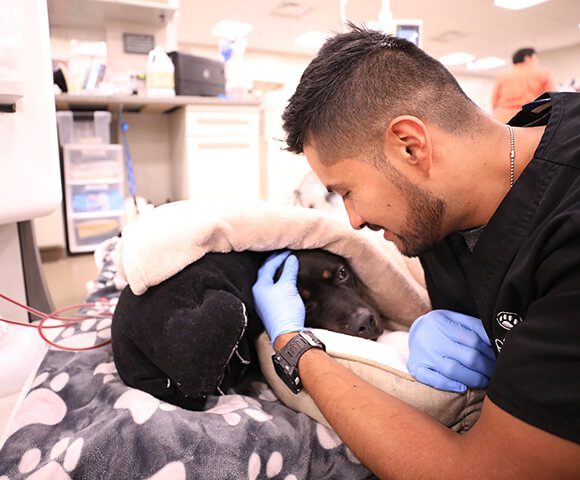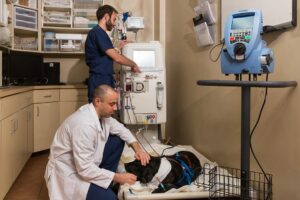Acute renal failure: Symptoms, diagnosis and treatment.
The kidneys perform many vital functions, including the removal of various toxins from the body. These toxins are waste products from normal cell functions. Acute kidney failure in dogs is a serious condition that needs medical attention as soon as it is observed.
When kidneys fail, they can no longer remove these toxins. “Acute” renal (kidney) failure means that the problem has developed relatively quickly.

Causes.
Many things can cause acute kidney failure. Certain poisons are well known for their ability to damage the kidney. These poisons include:
- Antifreeze (radiator fluid, ethylene glycol)
- Lily plants (cats only)
- Raisins and grapes
- Certain drugs, including pain pills such as aspirin or ibuprofen (Advil® or Motrin®)
Severe infections in the kidney from bacteria can cause sudden kidney failure. Although kidney infections can occur spontaneously, usually there is a preexisting condition that reduces an animal’s ability to fight infection easily – such as kidney stones, partial urine blockage or chronic kidney disease.
Leptospirosis, also known as Weil’s disease, is a bacterial infection (Leptospira spp.) that can cause acute kidney failure in dogs, but very rarely in cats. Dogs get leptospirosis from urine or water contaminated by infected animals (deer, cattle, rats, raccoons, mice or other dogs).
Anything that decreases blood flow through the kidney can cause kidney failure. This includes dehydration from any cause (such as severe vomiting and diarrhea). Heatstroke or other disorders causing massive damage to body tissues, such as bee stings or snakebites, can also lead to kidney failure.
Symptoms.
Dogs or cats with acute kidney failure may have a variety of clinical signs.
Symptoms of kidney failure include:
Early stages of renal failure in dogs:
- Excessive thirst
- Urine volume
Later stages of renal failure in dogs:
- Lethargy
- Poor or absent appetite
- Vomiting
- In severe kidney failure, the amount of urine may actually decrease, or the pet may stop making urine altogether. Stomach or intestinal ulcers may develop which will result in either a black or tarry stool or vomiting of digested blood (which looks like coffee grounds).
Diagnosis.
Blood and urine tests are used to diagnose acute kidney failure and to assess the severity of disease. Other tests, such as radiographs (X-rays), ultrasound and special blood tests are usually necessary to help determine what might have caused the kidney failure. Sometimes a biopsy of the kidney is recommended.
However, the cause of kidney failure is not always easily discovered and may never be determined.
Treatment.
- IV fluids: the initial treatment for acute kidney failure is intravenous (IV) fluids. These fluids are used to restore good hydration and to flush out the substances that the kidneys should be removing from the bloodstream. Urine production is monitored throughout the IV fluid therapy as a decrease in urine can indicate the need for other therapies.
- Medications: in addition to fluid treatment, other medications are commonly used. Antibiotics are given if the cause of the kidney failure is known or suspected to be infection. More medications may be required depending on the clinical status of the patient.
- Temporary feeding tube: because kidney failure drains the body’s resources, and pets with kidney failure frequently refuse to eat, a temporary feeding tube may be recommended.
- Careful monitoring: the clinical condition of dogs and cats with acute kidney failure can change rapidly. Careful monitoring is necessary. This may include repeatedly checking blood pressure, body weight, electrocardiogram and blood tests. It may also be necessary to place a urinary catheter to measure urine volume.
Potassium.
Potassium is an electrolyte normally found in the blood in low levels. With acute kidney failure, potassium levels may increase to dangerous levels, unlike in chronic kidney failure when levels tend to decrease. The increased potassium level slows the heartbeat and can cause the heart to stop. Alternatively, very high blood pressure could also develop because of the kidney failure, so blood pressure medication is frequently needed. High blood pressure can cause blood vessels in the eye or brain to burst.
Fluid retention.
Fluid retention may occur if urine production is less than IV fluid input. This may manifest itself as increased body weight, belly bloating, swollen legs, or shortness of breath if fluid builds up in the lungs.
Advanced therapies.
Not all animals with acute kidney failure will respond to IV fluids. Advanced therapies such as peritoneal dialysis or hemodialysis may be necessary. Signs that indicate these therapies should be considered include:
- Dangerously high potassium level
- Fluid in the lungs
- Lack of improvement in laboratory results while a patient receives IV fluids
Peritoneal dialysis.
Peritoneal dialysis involves placing a tube directly into the belly cavity then pushing fluid into the belly, which is later drained out.
This flushes out many toxins the kidneys are failing to remove. Initially, this procedure requires a doctor or nurse 24 hours a day to keep flushing the fluid in and out. Unfortunately, even in the best of circumstances, complications such as infection around the tube and clogging of the tube are frequent after only a few days. 
Hemodialysis.
Hemodialysis involves putting a large IV catheter in a vein and using the catheter to remove a quantity of blood, which is then sent through a machine that cleans the blood. Hemodialysis is effective, but only a handful of veterinary hospitals are equipped to do hemodialysis. Both peritoneal dialysis and hemodialysis are very expensive treatment options.
Prognosis.
Despite all the advances in the treatment of acute kidney failure, it remains a serious and often fatal disease. About 60% of dogs and cats with this disease either die or are humanely euthanized because of failure to respond to supportive care.
Dialysis is usually reserved for those patients in whom medical treatment has failed, and the chance of death without dialysis is almost 100%. In those patients, 50% may recover with dialysis, depending on the underlying cause of kidney failure.
Even in patients who recover from acute kidney failure, the recovery may be incomplete, leaving the patient with chronic kidney disease that will require life-long ongoing care.
For more information on this subject, speak with the veterinarian about getting a referral to a veterinary internal medicine specialist. BluePearl Pet Hospitals provide internal medicine services that can help diagnose and treat acute renal failure in dogs. Search for a BluePearl internal medicine specialist near you.


